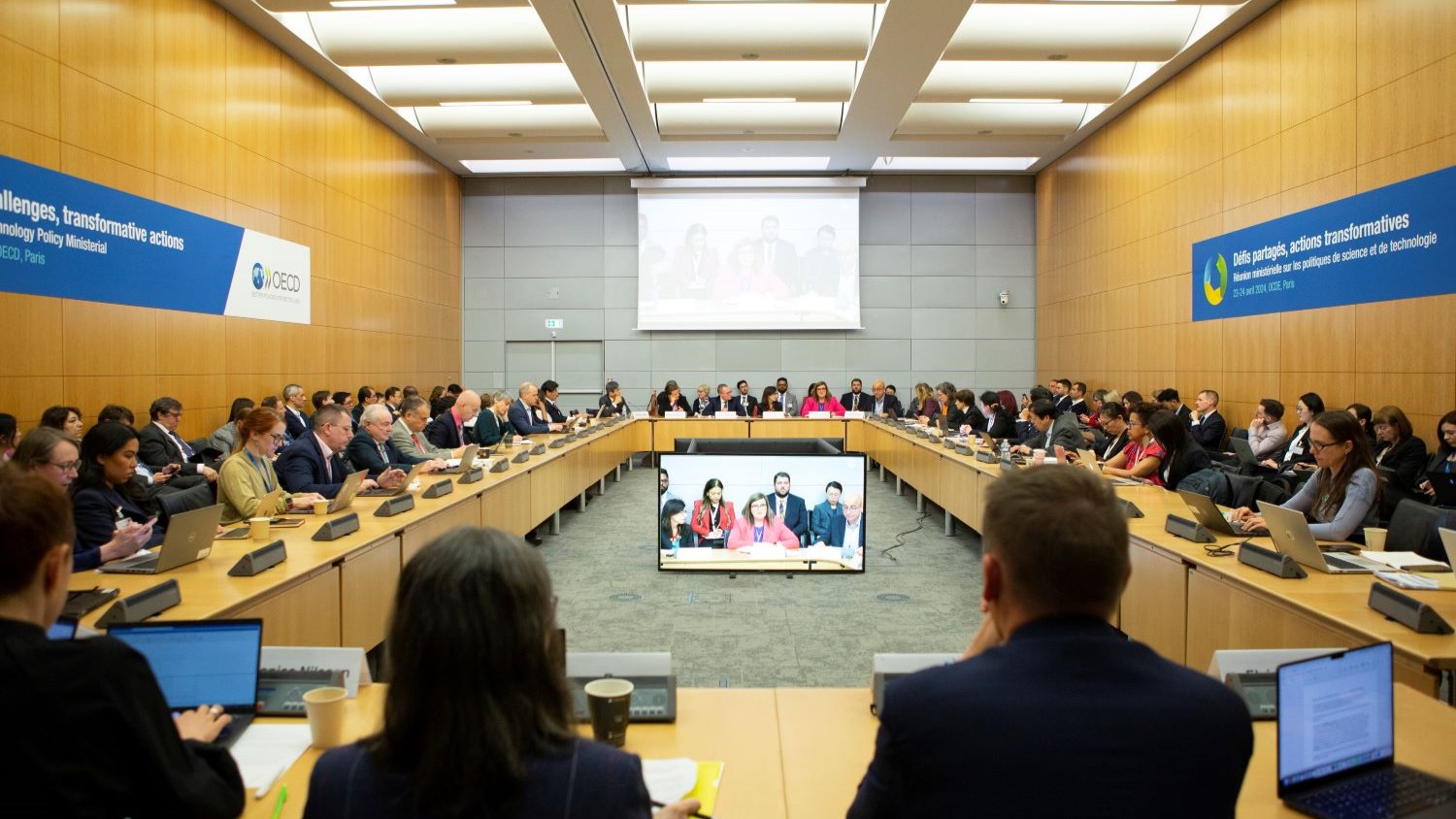International leaders discuss how to use science, technology and innovation to create sustainable solutions

On Apr 23, 2024 international professionals in government, academia, industry and civil society participated in the Multi-stakeholder high-level Dialogue hosted by the Organization for Economic Cooperation and Development (OECD). (Photo credit: Maud Bernos, OECD)
On April 23, thought leaders from around the world gathered in Paris, France, at the Science and Technology Ministerial hosted by the Organization for Economic Cooperation and Development (external link) (OECD). Professionals in government, academia, industry and civil society, participated in debates to inform decision-making and connect stakeholders. As countries make significant investments to drive technological advancements for digital and green transitions, the event focused on the challenge of equipping individuals with future skills to create an inclusive transition.
Wendy Cukier, academic director and founder of the Diversity Institute (DI) and academic research director of the Future Skills Centre (external link) , was an invited expert panelist. Susana Borrás, a professor at the Copenhagen Business School, moderated the panel and focused on government approaches to addressing emerging technology-driven skill demands and initiatives targeting underrepresented groups.
Elvira Uyarra, a professor at the University of Manchester in the U.K., opened the discussion by highlighting that the green transition requires a systemic place-based approach. While certain industries may be more well-placed to make a green transition, training programs are needed to support other industries so that the green transition happens in all regions and sectors, she said. Uyarra added that it’s important to collaborate with regional governments so that local data can inform where reskilling happens.
Then, Lionnel Alexandre, Carbon Business Lead at Bayer Crop Science, focused on the green transition in the agriculture sector. He said that the agriculture sector is one of the biggest victims of and one of the biggest contributors to climate change. While technology has increased a lot in agriculture, more work needs to be done, he said, pointing to farmers' implementation of the technology. “We need to increase the grower’s adoption of these new practices and new technologies,” Alexandre said.
“If we do not understand the processes of driving change at the political level, the organizational level and the individual level, we will not reap the benefits,”
Sarah Jameson, policy advisor of the Trade Union Advisory Committee to the OECD, spoke about how to ensure the transition is a just one. She highlighted the important role of social partners and trade unions in addressing barriers workers face in accessing training and upskilling opportunities. “They do this through negotiating rights to training and the conditions to exercise these rights in practice, such as paid training or leave in collective agreements,” Jameson said.
Then, Cukier spoke about the importance of an ecological lens in the green transition. She opened by highlighting the successful work of the OECD in outlining the difference between invention and innovation. To create change and move toward sustainable practices, she said, it’s not only about creating new technology, it’s about driving social change and adoption. “If we do not understand the processes of driving change at the political level, the organizational level and the individual level, we will not reap the benefits,” Cukier said.
Pointing to the COVID-19 pandemic as an example, she said, “Inoculation is an innovation.” She highlighted that it required multiple partners, disciplines and a shared vision to protect people from the virus. Cukier encouraged everyone to think about the green transition as an even greater priority. “As a species, we have survived multiple pandemics, but we will not survive the destruction of the world.”
Cukier emphasized the importance of defining green skills, and the role of reskilling and upskilling programs, like ADaPT and DI’s other training and work placement programs. She pointed to a recent DI report, which shows the important role that small and medium-sized enterprises (SMEs) play in the transition to net-zero. She said that the most common areas within SMEs that need to transition to more sustainable practices are procurement, product design and infrastructure. Through training programs, digital and green skills can be more accessible and help to address the gaps. “We really have to break that notion that STEM [science, technology, engineering and math] and green skills are the same thing,” she said.
Cukier also highlighted the importance of the Indigenous perspective in any discussions about sustainability, because Indigenous Peoples bring a perspective of seven generations: a long-term view on everything that they do. To live out Canada’s commitment to truth and reconciliation, Cukier said we also need to recognize the impact of environmental racism. “We don't just have an issue with unequal access to skills and opportunities, but we have disproportionate effects on equity-deserving groups in terms of the negative impacts of environmental degradation,” she said. She cautioned that society cannot repeat mistakes that have been seen in the digital transformation. “We do not want a green-divide, where some people experience the negative impacts more than others and have less access to the opportunities,” Cukier said, emphasizing that the transition to net zero must prioritize inclusion.
To close, Cukier emphasized the important contribution the OECD can continue to make around tracking, sharing research, and ensuring impact and accountability. Pointing to the OECD rankings, Cukier said that as a tool, it helps hold countries accountable and drive change. She said, “They have an impact in driving organizations forward through the sharing of best practices, recognizing what we should replicate and what we should scale.”
